When it comes to the warehouse management app, it’s like a digital Marie Kondo. These apps are a real game changer for businesses. With its superpowers of efficiency and organization, it will have your supply chain running smoother than before.
Now you might be wondering, “ What makes this app so special?”
The real-time tracking of your inventory, from the moment it arrives at the warehouse to the second it bids farewell to its shelves. With a few taps, you can easily navigate through the stock levels and shipping information.
It saves time and enhances productivity. According to the business wire, the market is expected to grow by 1.5x and is further expected to cross $37.6 Bn by 2030.
As your business expands so will your warehouse needs. The app is flexible and scalable, accommodating your growth and evolving requirements without a hitch.
Moreover, the warehouse management app brings all the data you need right to your fingertips. But wait this app doesn’t stop at inventory management. It’s also a wizard when it comes to optimizing space and reducing unnecessary clutter.
So without any further delay let’s dive right into the blog to know more.
What Is A Warehouse Management App?
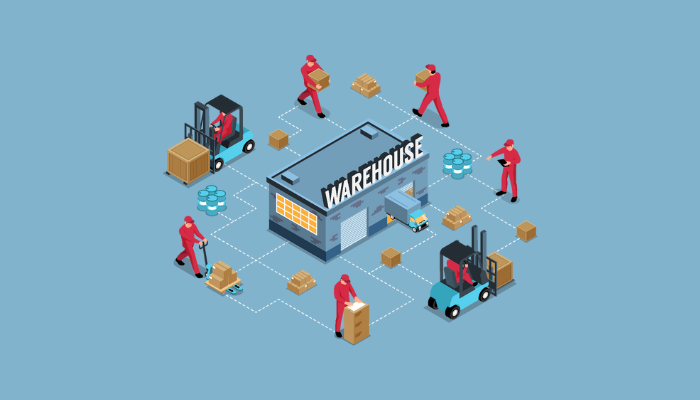
A warehouse management app is a software application designed to streamline and optimize various aspects of warehouse operations. It provides businesses with tools and features to efficiently manage their inventory, track stock movements, fulfill orders and monitor warehouse performance.
They play a crucial role in improving efficiency, reducing errors, and enhancing overall warehouse operations. As such, it is closely related to logistics software development.
Moreover, by automating manual processes, providing real-time data, and optimizing resource utilization these apps empower businesses to meet customer demands effectively and maintain a competitive edge in the market.
For businesses with multiple warehouses, the app may offer multi-warehouse support allowing centralized management and coordination of inventory across various locations.
In addition, some apps offer mobile compatibility, enabling warehouse staff to access and update information on the go using smartphones or tablets.
With this being said, let’s look at the benefits of developing warehouse management software for business.
Types Of Warehouse Management Systems
Several types of WMS solutions help you in determining which type of work is best for your business. Take a look.
| Standalone warehouse management systems | A standalone WMS operates independently and may not be integrated with other business systems, such as ERP or e-commerce platforms.
Although they are suitable for businesses with warehouse needs or those not requiring extensive integration. |
| On-premises WMS | This traditional type of WMS is installed and maintained on the company’s own servers and hardware within its premises. |
| Integrated with enterprise resources planning (ERP) systems | The enterprise WMS is suitable for large-scale operations with complex warehouse networks and multiple locations. It provides advanced features and scalability to accommodate a high volume of inventory transactions. |
| Cloud-based warehouse management systems | Cloud-based WMS is hosted on external servers by a third-party provider and accessed via the Internet. It offers scalability, flexibility, and reduced IT infrastructure costs as the provider handles maintenance and updates. |
| SaaS (Software-as-a-service) WMS | SaaS WMS is a subscription-based cloud solution where users pay for the software on a monthly or annual basis. Plus, it offers quick implementation, automatic updates, and accessibility from any device with an internet connection. |
| Small & medium business WMS | SMB solutions are tailored to meet the needs of smaller businesses with simpler warehouse operations and lower transaction volumes. |
Benefits Of Developing Warehouse Management Software For Business
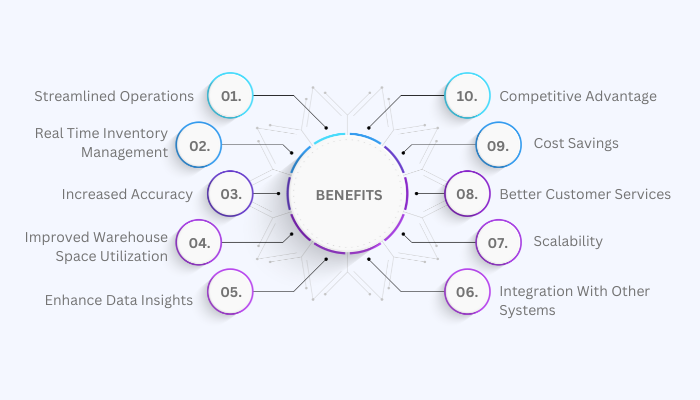
Developing custom warehouse management apps (WMS) for a business can provide a wide range of benefits, tailored specifically to its unique needs and requirements.
Some of the key benefits of developing custom software development are mentioned below:
Streamlined Operations
A warehouse manager app can automate and optimize various warehouse processes, leading to increased efficiency and smoother operations.
While this streamlining can save time, it can reduce errors and improve overall productivity at the same time.
Real-Time Inventory Management
Another benefit of custom WMS, businesses gain real-time visibility into their inventory levels, allowing for better demand forecasting, timely restocking, and preventing stockouts or overstocking.
Increased Accuracy
The automation of tasks like order picking, packing, and shipping reduces human errors, leading to higher order accuracy.
On the other hand, improved accuracy means satisfied customers and reduced returns and complaints.
Improved Warehouse Space Utilization
Custom WMS solutions can implement space optimization algorithms ensuring that the warehouse layout is efficient and that storage space is utilized to its maximum potential reducing storage costs.
Enhance Data Insights
It can provide detailed analytics and reports on various aspects of warehouse operations. This data-driven report on various aspects of warehouse operations.
Integration With Other Systems
The warehouse management system mobile app can be tailored to integrate seamlessly with other business systems like enterprise Resource Planning (ERP), e-commerce platforms, and transportation management systems, creating a unified and interconnected workflow.
Scalability
In the first place, Custom WMS solutions can be designed to grow with the business, accommodating increased inventory levels, expanding product lines, and supporting multiple warehouse locations.
Better Customer Services
With streamlined operations and improved accuracy, businesses can provide faster order fulfillment and shipping, leading to happier customers and improved customer retention.
Cost Savings
The automation and optimization provided by a warehouse management system mobile app can lead to reduced labor costs, lower inventory holding costs, and minimized operational expenses, resulting in overall cost savings for the business.
Competitive Advantage
A custom WMS can give businesses a competitive edge by improving efficiency, accuracy, and customer service. Besides this advantage, it helps them stand out in the market and attract more customers.
Key Features To Include In the Warehouse Management App
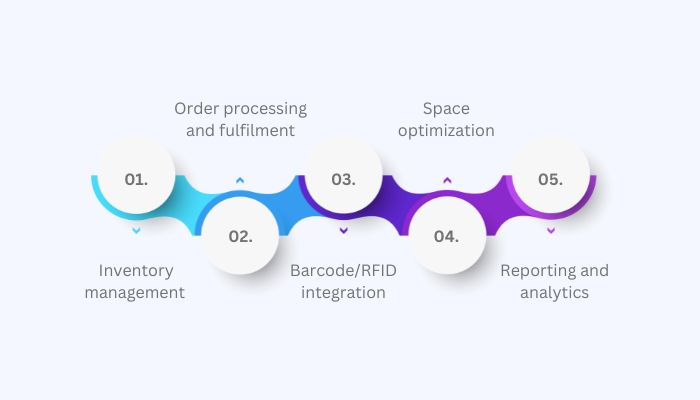
When it comes to warehouse management apps, a WMS consists of several parts of applications. With this let’s start with a warehouse mobile app feature.
Inventory management
This is the most important feature of the inventory management system, with this users can keep track of inventory levels, stock movements, and locations in real time.
Order processing and fulfillment
Efficiently process incoming orders and manage order status and this feature will optimize the picking process with location-based instructions for order fulfillment.
Barcode/RFID integration
Seamlessly integrate with barcode or RFID technology for easy item tracking and verification.
Space optimization
Optimize warehouse space to maximize storage capacity and minimize wasted space.
However, slotting optimization dynamically assigns products to storage locations based on demand and product characteristics.
Reporting and analytics
This feature generates reports and analytics on key warehouse performance metrics and presents data in a visually informative manner for quick decision-making.
Factors To Consider When Designing A Warehouse Management App
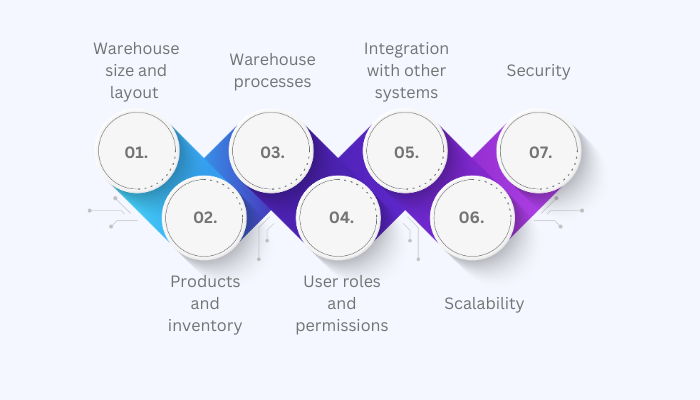
Designing a warehouse inventory management app requires careful consideration of various factors to ensure its efficiency, usability, and effectiveness. Thus, here are some factors to consider when designing a warehouse management app:
Warehouse size and layout
The size and layout of the warehouse have a big impact on the features and functionality of your app. Picture this, if you have a large warehouse with multiple picking zones, you’ll require an app that can track inventory across multiple locations.
Products and inventory
The types of products you store in your warehouse will also affect the design of your app. For example, if you store hazardous materials, you’ll need an app that can track their location and prevent unauthorized access.
Warehouse processes
The specific processes that take palace in your warehouse will also need to be reflected in your app. If you are using barcode scanning, your app will need to be able to read and interpret barcodes.
User roles and permissions
Different users in your warehouse will need different levels of access to the app. For example, warehouse managers will need access to all areas of the app, while pickers may only need access to the picking modules.
Integration with other systems
Your warehouse management app may need to integrate with other systems, such as your ERP system or your shipping software. With this it allows you to share data between systems and streamline your operations.
Scalability
As your business grows, you’ll need to make sure that your warehouse management app can scale with you. This means that the app should be able to handle increased traffic and data volumes.
Security
Your warehouse management app will contain sensitive data, such as inventory levels and customer information. It is important to make sure that the app is secure and that your data is protected.
Reason To Develop A Custom Warehouse Management App
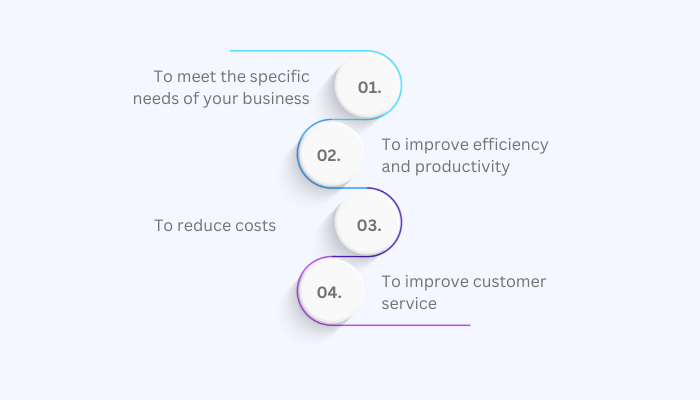
There are many reasons why you might want to develop a custom warehouse management app. Here are a few of the most common reasons:
· To meet the specific needs of your business
Off-the-shelf warehouse management apps may not be able to meet the specific needs of your business. But if you have a unique warehouse layout or a complex set of inventory requirements you may need to develop a custom app to meet your specific needs.
· To improve efficiency and productivity
A custom warehouse management app can help you improve efficiency and productivity in your warehouse. An app that can track inventory in real-time as a result it helps you to avoid stockouts and ensure that orders are filled quickly and accurately.
· To reduce costs
Now, when you develop a custom warehouse management system it can help you reduce costs in several ways. For example, an app that can automate tasks such as picking and packing can help you reduce labor costs.
· To improve customer service
Another reason to develop a warehouse management mobile app as it can help you to improve customer service by providing you with real-time visibility into inventory level and order status.
This can help you to meet customer expectations and avoid delays in shipping.
How much does it cost to create a warehouse management app?
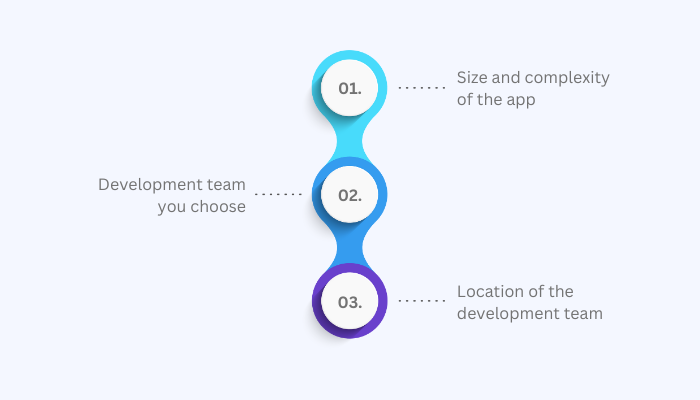
The cost of creating a warehouse management app can vary depending on several factors, including the size and complexity of the app, the features you need, and the development team you choose.
In general, you can expect to pay anywhere from $20,000 to $70,000 or more to create a custom warehouse management app. However, the cost could be lower or higher depending on the specific factors involved.
Here are some of the factors that can affect the cost of creating a warehouse management app:
Size and complexity of the app
The more features you include in your app the more complex it will become and the cost will eventually increase.
Development team you choose
The cost of development will vary depending on the experience and expertise of the development team you choose.
Location of the development team
The cost of development can also vary depending on the location of the development team. For example, development teams in the US tend to be more expensive than development teams in Asia and Eastern Europe.
If you are low on your budget, you can consider developing MVP for your app. And it’s important to get quotes from an expert development company before making any decision.
Conclusion
A warehouse management app can be a valuable tool for businesses of all sizes. No matter which option you choose, a warehouse management app can be a valuable investment for your business. By streamlining your operations and improving customer service, you can increase profits and improve your competitive edge.
For this hire an expert mobile app development company to create a custom warehouse management app for you.
FAQs
A warehouse management app is a software application that helps businesses manage their warehouses. These apps can automate tasks, improve efficiency, and provide real-time visibility into inventory levels and order status.
There are two main types of warehouse management apps: cloud-based and on-premise. Cloud-based apps are hosted on the cloud and can be accessed from anywhere. On-premise apps are installed on a local server and can only be accessed from within the organization.
The cost of using a warehouse management app varies depending on the type of app, the features, and the number of users. Cloud-based apps are typically more affordable than on-premise apps.
Once you have chosen a warehouse management app, you will need to install it and configure it to meet your needs. The installation process will vary depending on the type of app you choose. Once the app is installed, you will need to create users and assign them roles. You will also need to import your inventory data into the app.
Cloud-based warehouse management apps offer several benefits, including:
- Accessibility
- Scalability
- Cost-effectiveness
There are a few challenges that businesses may face when using a cloud-based warehouse management app, including:
- Security
- Connectivity
- Data Ownership

Niketan Sharma is the CTO of Nimble AppGenie, a prominent website and mobile app development company in the USA that is delivering excellence with a commitment to boosting business growth & maximizing customer satisfaction. He is a highly motivated individual who helps SMEs and startups grow in this dynamic market with the latest technology and innovation.
Table of Contents




No Comments
Comments are closed.